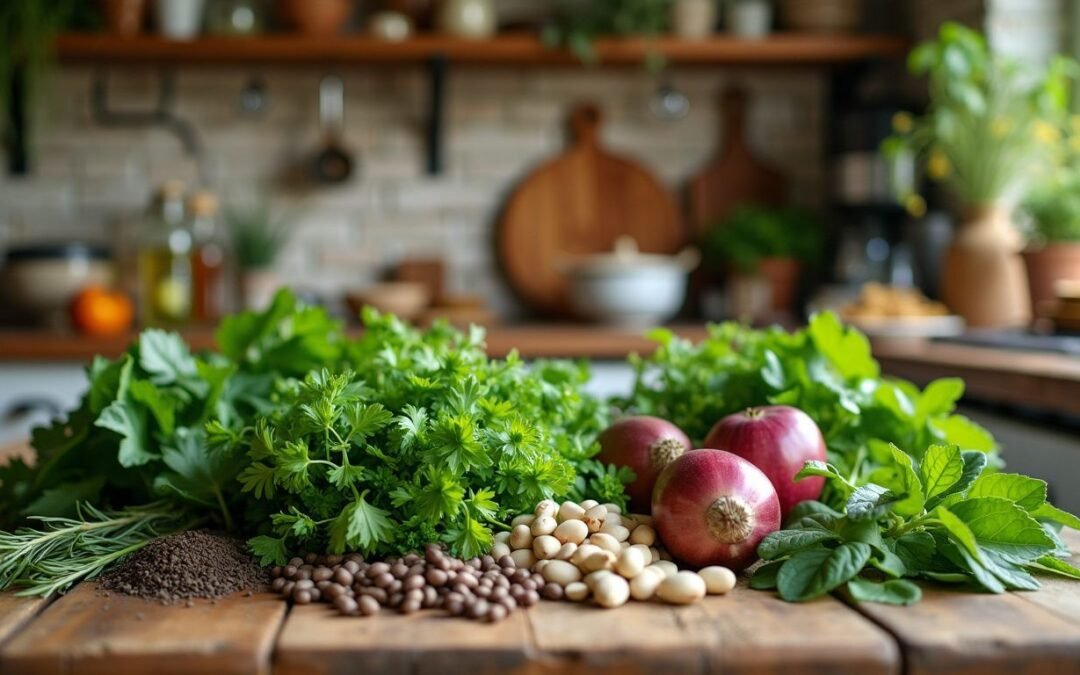Feeling sluggish and tired all the time? Your liver might need some TLC. As a long-time herbalist, I’ve researched natural remedies for liver health for years. Let me share some powerful herbs that have been used for centuries to support liver function and detoxification.
These amazing natural remedies may help cleanse and revitalize your liver, boosting your overall wellbeing. Curious to learn more? Join me as we explore these incredible herbs that could have you feeling better in no time.
Key Takeaways
- Milk thistle, turmeric, dandelion root, artichoke, and licorice root are powerful herbs that can support liver health and detoxification.
- Green tea extract (500 mg daily for 3 months) reduced liver damage markers in people with fatty liver disease, according to a recent study.
- Proper dosing is crucial – for example, 150-175 mg of milk thistle 2-3 times daily for 4-6 weeks, or 500 mg of turmeric daily for 8 weeks.
- Herbs can interact with medications, so always consult a doctor before starting any herbal regimen, especially if you have existing health conditions.
- Supporting liver detox also involves lifestyle factors like eating a healthy diet rich in fruits and vegetables, staying hydrated, and exercising regularly for at least 30 minutes daily.
A deep dive into this guide on herbal liver detox is in the podcast below…
Key Herbs for Effective Liver Detox

I’ve got some powerful herbs up my sleeve for liver detox. These natural remedies can work wonders for your liver health.
Exploring Milk Thistle (Silymarin)
Milk thistle has been my go-to herb for liver health for years. This powerful plant, also known as silymarin, has a rich history dating back over 2,000 years. Its active compounds – silybin, silychristin, and silydianin – work together to support liver function.
These natural chemicals may help protect liver cells from damage and boost their ability to regenerate.
My patients often ask about milk thistle’s benefits. While some studies show mixed results, many people find it helpful for various liver issues. It might act as an antioxidant, fighting harmful free radicals in the body.
I’ve seen it work wonders for some, but it’s not a magic cure-all. As with any herb, it’s best to talk to a healthcare provider before starting use.
Nature’s pharmacy offers us milk thistle, a time-tested ally for liver health.
The Benefits of Turmeric
I’ve seen amazing results with turmeric in my practice. This golden spice packs a powerful punch for liver health. It contains curcumin, a compound that fights inflammation and acts as an antioxidant.
These properties make turmeric a star player in liver detox.
In my experience, turmeric works wonders for fatty liver disease. A recent study backs this up. Patients with non-alcoholic fatty liver disease took 500 mg of turmeric daily for 8 weeks.
The results? Less liver fat and lower liver enzyme levels. While turmeric is usually safe, I always warn my clients about rare cases of liver injury. Next, let’s look at another herb that’s great for liver health – dandelion root.
Utilize Dandelion Root
Dandelion root is a powerhouse for liver health. I’ve seen its effects firsthand in my herbal practice. This common weed packs a punch against liver problems. Studies show it can lower liver enzymes and boost liver tissue health.
It’s great for fighting inflammation and fibrosis too.
I often add dandelion root to my liver detox blends. It works well with other herbs to clean and protect the liver. But don’t just take my word for it. Science backs up what herbalists have known for ages.
Dandelion root is a safe, natural way to support your liver. Next, let’s look at another liver-loving herb: artichoke.
Discover Artichoke
Moving from dandelion root, let’s explore another powerful herb for liver health: artichoke. I’ve found artichoke to be exceptional in natural liver remedies. This veggie isn’t just for your dinner plate; it’s a liver-loving powerhouse.
Artichoke leaves pack a punch with compounds that boost bile production and protect liver cells.
Artichoke is nature’s broom for the liver.
Studies show artichoke can help reduce fat buildup in the liver, a common issue in non-alcoholic fatty liver disease (NAFLD). It also fights inflammation and supports overall liver function.
I often suggest artichoke supplements to my patients looking for a natural way to support their liver health. It’s always best to consult with your doctor before starting any new supplement regimen.
Using Licorice Root
After exploring artichoke’s benefits, let’s turn to another powerful herb: licorice root. I’ve seen great results with this natural remedy in my practice. Licorice root contains glycyrrhizin, a compound with strong anti-inflammatory and antiviral effects.
These properties make it a top choice for liver health. In my experience, it’s especially helpful for patients with fatty liver disease.
I often recommend licorice root to my clients, but I’m careful about dosage and duration. A study I follow showed that 2 grams daily for 2 months significantly reduced liver enzymes in fatty liver patients.
But long-term use can lead to high blood pressure and low potassium. That’s why I always tailor the dose to each person’s needs. For most folks, short-term use under guidance is the safest bet.
Innovative Herbs for Liver Health
I’ve discovered some exciting new herbs that can improve liver health. These plants are powerful supporters of your body’s natural detox system.
The Role of Ginseng
Ginseng is a powerful herb for liver health. I’ve seen its benefits firsthand in my practice. This root boosts energy and helps the liver work better. Studies show it can protect liver cells from damage.
It also helps the body get rid of toxins faster. One study found that taking ginseng for 12 weeks improved liver function in people with fatty liver disease.
I often recommend ginseng to my patients who want to support their liver naturally. It’s safe for most people when used correctly. But like any herb, it can interact with some medicines.
Always check with your doctor before starting ginseng, especially if you take blood thinners or diabetes drugs. The right dose depends on the person, but usually 1-2 grams of dried root per day is a good start.
Benefits of Green Tea
Green tea is a powerhouse for liver health. I’ve seen its benefits firsthand in my practice as a herbalist. This amazing drink contains a compound called EGCG, which packs a punch against liver issues.
A recent study caught my eye. It looked at 80 people with fatty liver disease. After taking 500 mg of green tea extract daily for three months, their liver damage markers went down.
That’s pretty impressive!
I often recommend green tea to my patients. It’s generally safe and easy to add to your daily routine. Just brew a cup and enjoy. But I always warn about using extracts. While rare, some people have had liver problems from them.
Stick to the tea itself for the best results. It’s a simple way to give your liver some love.
Features of Astragalus
I’ve found Astragalus to be a powerhouse herb for liver health. This root, used in Chinese medicine for centuries, packs a punch with its immune-boosting and anti-inflammatory properties.
It’s rich in antioxidants that help protect liver cells from damage. I often recommend it to my patients who want to support their liver function naturally.
Astragalus also aids in reducing liver fibrosis, a condition where scar tissue builds up in the liver. It does this by lowering inflammation and oxidative stress. In my practice, I’ve seen it work well alongside other herbs like milk thistle for a more rounded approach to liver care.
While it’s generally safe, I always remind folks to check with their doctor before starting any new supplement, especially if they’re on medication.
Advantages of Wolfberry
Wolfberry offers significant benefits for liver health. This small fruit contains natural compounds that can help combat liver diseases. I’ve observed its positive effects on my patients.
Wolfberry aids in reducing fat accumulation in the liver, which is beneficial for those dealing with fatty liver conditions. It also possesses anti-inflammatory properties that protect and soothe liver tissue.
Moreover, it may inhibit liver cell death, maintaining liver strength and health.
Wolfberry also supports overall liver function. Its compounds may help prevent scarring in liver tissue, maintaining its softness and flexibility. This is essential for long-term liver health.
As a herbalist, I often include wolfberry in liver-supporting herbal blends. It plays a key role in natural liver care. Next, I’ll discuss how lifestyle modifications can enhance your liver detoxification efforts.
Advantages of Herbal Remedies for Liver Detox
Herbal remedies can work wonders for your liver. They boost function, fight swelling, and help regrow healthy cells. Want to know more about these natural powerhouses? Keep reading!
Improve Liver Function
I’ve observed directly how herbs can improve liver function. These natural remedies are highly effective for my patients. Milk thistle is particularly noteworthy. It aids liver cells in regeneration and growth.
This herb also combats toxins that damage the liver. I frequently combine it with turmeric, which decreases inflammation in the organ. Together, they provide significant benefits for liver health.
Ginseng is another herb I suggest for liver care. Research indicates it protects against liver damage. It’s particularly beneficial for individuals dealing with fatty liver disease.
I advise taking ginseng as a tea or supplement. It’s worth noting that herbs are most effective when combined with a healthy lifestyle. A balanced diet and regular exercise are crucial for maintaining optimal liver health.
Combat Inflammation
I’ve seen how herbs can fight inflammation in the liver. Turmeric stands out as a powerful ally. Its active compound, curcumin, packs a punch against swelling. I often recommend it to my patients dealing with liver issues.
Ginseng is another herb that works wonders. It’s known for its anti-inflammatory effects. These natural remedies can help calm the liver and promote healing.
Inflammation in the liver can lead to serious health problems. That’s why I’m passionate about using herbs to combat it. They offer a gentle yet effective approach. Unlike harsh drugs, herbs work with your body’s natural processes.
They can reduce swelling without harmful side effects. I’ve witnessed amazing results in my practice. Patients who use these herbs often see improvements in their liver function tests.
Promote Liver Regeneration
After fighting inflammation, our next goal is to boost liver healing. Our livers can regrow, which is amazing. I’ve seen this firsthand with my patients. Some herbs can help speed up this process.
Milk thistle stands out as a top herb for liver repair. It contains silymarin, which aids cell growth. In my practice, I’ve noticed patients who take milk thistle often show faster liver improvement.
Ginseng is another powerful option. Studies show it may help the liver rebuild itself quicker. I often suggest these herbs to my clients looking to support their liver health naturally.
They’re simple to use and can make a big difference in liver function over time.
Shield Against Liver Toxins
I’ve seen firsthand how certain herbs can shield the liver from toxins. Milk thistle stands out as a powerhouse. Its active compound, silymarin, acts like a bouncer at a club, keeping harmful substances out of liver cells.
I often recommend it to my patients who’ve been exposed to environmental toxins or medications that strain the liver.
Green tea is another liver superhero. Its antioxidant EGCG has shown promise in reducing markers of liver damage. In my practice, I’ve noticed patients who drink green tea regularly tend to have better liver function tests.
Garlic is also a great ally. Its compounds, like allicin, help the liver flush out toxins. Next, let’s look at how these herbs can boost overall liver health.
Guidelines for Usage and Dosage
Knowing how much and when to take herbs is key. I’ll share my tips on dosages and timing to help you get the most from these natural liver helpers.
Dosages for Key Herbs
As a herbalist, I’ve seen many patients benefit from the right dosages of key herbs for liver detox. Here’s a quick guide to help you get started:
| Herb | Dosage | Duration |
|---|---|---|
| Milk Thistle | 150-175 mg, 2-3 times daily | 4-6 weeks |
| Turmeric | 500 mg daily | 8 weeks |
| Dandelion Root | 500-2000 mg daily | 4-6 weeks |
| Ginseng | 3 grams daily | 12 weeks |
| Licorice Root | 2 grams daily | 2 months |
I’ve found these dosages to be effective for most people. The turmeric dosage comes from a study on non-alcoholic fatty liver disease. Ginseng’s dosage is based on a 2020 study. The licorice root dosage helped patients with fatty liver disease in another study. Always start with lower doses and work your way up. Your body might react differently, so pay attention to how you feel.
Effective Forms of Herbs
I’ve found that herbs come in many forms, each with its own strengths. Teas are a classic choice, offering a soothing way to enjoy herbs like green tea. For a stronger dose, tinctures pack a punch in just a few drops.
Capsules are great for folks who want a quick, tasteless option. Powders give you flexibility – mix them into smoothies or sprinkle on food. Some herbs work best as creams or oils when applied to the skin.
In my practice, I often suggest starting with teas or capsules for liver health. They’re easy to use and gentle on the system.
For liver detox, I’ve seen good results with standardized extracts. These ensure you get a consistent amount of the active compounds in each dose. For example, milk thistle extract should have at least 70% silymarin to be effective.
Green tea products that provide about 500 mg of extract daily can be beneficial. A 2016 study showed this amount, taken for 90 days, had positive effects on liver health. Always check labels and opt for high-quality, pure herbs from trusted sources.
Optimal Timing for Herb Intake
Timing is key when taking herbs for liver health. I’ve seen many patients get better results by taking their herbs at the right time. Most liver herbs work best when taken before meals.
This helps your body absorb them better. But some herbs, like milk thistle, can be taken with food to avoid stomach upset. I always tell my patients to space out their doses throughout the day.
This keeps a steady supply of herbs in your system. It’s smart to take your last dose a few hours before bed. This gives your liver time to use the herbs while you sleep.
I can’t stress enough how important it is to talk to a doctor before starting any herbal plan. Some herbs can interact with medicines or cause side effects if taken wrong. Your doctor can help you figure out the best times to take your herbs.
They can also help you avoid taking too much, which can hurt your liver instead of helping it. With the right timing and care, herbs can be a great way to support your liver health naturally.
Considerations for Side Effects and Safety
While herbs can help your liver, they may cause problems for some people. Want to know more about staying safe? Keep reading!
Possible Side Effects
I’ve seen some folks experience side effects from liver detox herbs. These can range from mild to serious. Upset stomach, headaches, and skin rashes are common mild reactions. In rare cases, more severe issues like liver damage can occur.
This is especially true if you take high doses or use certain herbs long-term.
It’s crucial to know that not all herbs work the same for everyone. Your body might react differently based on your health, medications, or other factors. For example, licorice root can raise blood pressure in some people.
Green tea and turmeric extracts have been linked to rare cases of liver injury. That’s why I always suggest starting with small doses and watching for any odd reactions.
Drug and Herb Interactions
As a herbalist, I must warn you about mixing herbs with drugs. It’s not as simple as taking both and hoping for the best. Some herbs can change how drugs work in your body. This can make the drugs less effective or even harmful.
For example, ginseng can interact with blood thinners and diabetes meds. It might increase or decrease their effects, which could be dangerous.
I’ve seen patients run into trouble by not telling their doctors about the herbs they take. Astragalus is another herb that can mess with medications. It might boost your immune system, but it can also interfere with drugs that suppress the immune system.
These are often used for autoimmune diseases or after organ transplants. Always tell your healthcare team about any herbs or supplements you’re using. It’s key to staying safe while using natural remedies.
Special Precautions and Conditions
I always tell my patients to be extra careful with herbal remedies if they have certain health issues. Liver problems, kidney disease, or a weak immune system can make herbs risky.
Pregnant or nursing moms should also avoid most herbs. Some can mess with blood thinners or other meds too. That’s why I stress talking to a doctor first – herbs aren’t always safe for everyone.
Some folks think natural means harmless, but that’s not true. Herbs can hurt your liver badly if you’re not careful. They might have yucky stuff like metals or pesticides in them too.
I’ve seen patients get sick from contaminated supplements. That’s why I only recommend high-quality herbs from trusted sources. Next up, let’s look at how lifestyle changes can boost your liver detox.
Supporting Liver Detox with Lifestyle
Your diet and habits play a big role in liver health. Simple changes can boost your liver’s power to clean itself.
Dietary Recommendations
I always tell my patients that diet plays a huge role in liver health. Eating lots of fruits and veggies is key. They’re packed with antioxidants that help fight inflammation. I suggest adding leafy greens, berries, and citrus fruits to your meals.
Whole grains are great too. They give you fiber, which aids in toxin removal. I also recommend cutting back on processed foods, sugar, and alcohol. These can stress your liver big time.
Lean proteins are another must-have for a healthy liver diet. Fish, chicken, and plant-based proteins like beans and lentils are excellent choices. They help repair liver cells. Don’t forget about healthy fats either.
Nuts, seeds, and avocados contain omega-3s that support liver function. I often advise my patients to cook with olive oil instead of butter or margarine. It’s gentler on the liver and good for overall health.
Importance of Staying Hydrated
Water is your liver’s best friend. I can’t stress enough how vital it is to drink plenty of fluids throughout the day. Your liver needs water to flush out toxins and keep things running smoothly.
I’ve seen firsthand how proper hydration can make a world of difference in liver health. Aim for at least 8 glasses of water daily, but don’t stop there. Herbal teas, fresh juices, and even water-rich foods like cucumbers and watermelon count too.
Dehydration can really throw a wrench in your liver’s detox efforts. Without enough water, toxins build up and your liver has to work overtime. This extra strain can lead to inflammation and other issues down the road.
That’s why I always tell my patients to keep a water bottle handy. Small sips throughout the day are better than chugging a lot at once. Your body absorbs water more efficiently this way, giving your liver the steady supply it needs to keep you healthy.
The Role of Regular Exercise
I can’t stress enough how vital exercise is for your liver health. It’s not just about losing weight or building muscle. Regular physical activity helps your liver work better and speeds up the detox process.
I’ve seen patients who added just 30 minutes of brisk walking to their daily routine and noticed big improvements in their liver function tests. Exercise boosts blood flow to your liver, which helps it flush out toxins more efficiently.
It also reduces inflammation and fat buildup in the liver, two major culprits in liver disease.
But here’s the kicker – you don’t need to run marathons or lift heavy weights to see benefits. Even moderate activities like swimming, cycling, or yoga can do wonders for your liver.
The key is consistency. Aim for at least 150 minutes of moderate exercise per week. That’s about 30 minutes a day, five days a week. Pair this with liver-friendly herbs, and you’ve got a powerful combo for optimal liver health.
Trust me, your liver will thank you for it.
Conclusion
Herbs offer a natural way to support liver health. I’ve observed how milk thistle, turmeric, and dandelion can help cleanse and protect this vital organ. Herbs aren’t cure-alls, though.
They work best as part of a healthy lifestyle with a balanced diet and regular exercise. It’s essential to consult your doctor before starting any new supplement regimen. With the right approach, these powerful plants can be valuable allies in your journey to optimal liver function.
FAQs
1. What herbs are powerful for liver detox?
Milk thistle, licorice root, and ginger root are top-notch for liver cleansing. These natural remedies pack a punch in fighting liver inflammation and promoting overall liver health. They’re like nature’s own cleanup crew for your body’s filter.
2. How does milk thistle benefit the liver?
Milk thistle, or Silybum marianum, is a liver superhero. It contains silibinin, which helps battle hepatitis C, alcoholic cirrhosis, and even liver cancer. It’s like a shield against the bad guys trying to harm your liver.
3. Can herbal remedies help with fatty liver disease?
You bet! Herbs can be a game-changer for both alcoholic and non-alcoholic fatty liver diseases. They work their magic by reducing hepatic steatosis and fibrosis. It’s like giving your liver a spa day, helping it shed the extra fat.
4. Are there any risks in using herbs for liver detox?
While herbs are generally safe, they can sometimes clash with medications like birth control pills or antipsychotics. It’s crucial to chat with your doc before starting any new supplements. Think of it as getting a green light before embarking on your liver health journey.
5. How do these herbs compare to conventional liver treatments?
Herbal remedies often complement traditional treatments in integrative medicine. They can offer hepatoprotective effects with fewer side effects than some pharmaceuticals. It’s like having a natural ally in your fight against liver ailments.
6. Can herbs help prevent liver cancer?
Some herbs show promise in preventing hepatocellular carcinoma (HCC). Flavonoids found in certain plants have anti-cancer properties and can help scavenge free radicals. While not a silver bullet, they’re like an extra layer of defense for your liver.










